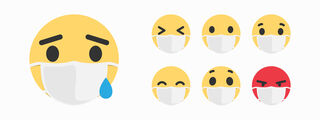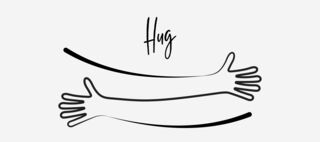Stress
The Emotions of Living Through a Pandemic
A through Z.
Posted August 13, 2020 Reviewed by Jessica Schrader

So much of my work as a counseling psychologist is validating my clients' emotions because what they say and feel is important. This core ideal that runs through the thread of therapy is crucial to emphasize when living through a pandemic. As you navigate day after day ... whether it's working, watching your children, taking classes, or just being—your emotions are likely a roller coaster of ups and downs.
I've compiled this list of A through Z emotions in hopes that it will be a comfortable companion during this emotional roller coaster. Whenever I ride a roller coaster, I enjoy hearing the laughs and screams (and sometimes tears) of the person next to me. It makes whatever I'm feeling a little more real and even bearable. So use this A-Z list to know you're not alone in your feelings, what you are feeling matters, and just like the best and worst of rides, it will end.
A: Angry. You're angry that the rules keep changing, angry that stores have different hours, angry that your relatives don't believe in masks, angry that your relative posted something on social media that contradicts with your political beliefs, and angry that COVID even exists in the first place. If you have been infected with COVID or know someone who has you, this anger may even elevate to rage.
B: Bored. If you hear your kids say they are bored one more time, you'll go back to being angry again! You're so bored you've gone to working on puzzles. Your children are so bored, you have caved and let them play questionable video games, you've subscribed to Disney Plus, and you let your children have more screen time than your pre-COVID self would ever allow.
C: Cautious. You hesitate when making decisions. Is it safer to go to the store with a mask and gloves or safer to order via delivery? Do you visit your aging mother since she lives alone, or do you insist on video calls only? Your school is open now with COVID precautions in place, so do you send your child or decide to keep them home for virtual learning? Even for those of us who typically make decisions with certainty and stick to them, the doubt is creeping in. With so many changes in policies and social norms, COVID has brought with it a big ball of confusion. Being uncertain about what's the best thing to do has become the norm rather than the exception.
D: Depressed. You feel sad. Things that used to bring you pleasure and joy don't interest you and do not bring you satisfaction like they used to. You have less motivation and have difficulty concentrating. Michele Obama described experiencing her own low-grade depression due to the pandemic. Your appetite and sleep habits might be changing too. What's especially challenging about being depressed while trying to stop the spread of COVID-19 is that so many of our adaptive coping strategies involve socializing with other people and getting outside of the house. Attending church, going to the gym, and attending parties, for example, are either discouraged, prohibited, or unavailable. Be compassionate with yourself if you are depressed right now. It is an understandable (although typically unwanted) response to the pandemic and the changes COVID brings to day-to-day life.

E: Eager for this to be over. You crave for the way things were. You feel like you are living in the Twilight Zone. You feel like you are living in a movie that pre-pandemic would have felt far fetched. You have a countdown for when there's a vaccine available.
F: Fearful. There is a lot to be afraid of. You are afraid you might die. You are worried your loved ones might get sick and die. Both adults and children are facing their mortality in unprecedented ways for our modern era.
G: Grieving. Currently, over 160,000 people in the United States have died from COVID-19. Approximately $740 people have died from COVID-19 worldwide. Losing a family member, a friend, a role model, a community member—it is shocking and devastating. About 1.4 million people in the U.S. have reported being jobless. Losing your job can also lead you to mourn your identity because many of us equate who we are with what we do.
H: Hungry. You find yourself snacking more than normal. When working from home, the fridge is just too accessible. And if you're not working, even worse! But if your kids tell you they're hungry one more time—your emotional roller coaster will likely take a dip into annoyance or frustration (not the "A" or "F" emotion words listed, but still just as valid!).
I: Inadequate. You don't feel "you're good enough." You feel like you are disappointing your boss, your partner, your parents, your children, and let's not forget your friends. Women seem to be especially feeling inadequate these days and even engaging in self-blame. Remember ladies—we're in a pandemic! This is not your fault.
J: Joyful. You are appreciating the "little things" more. You appreciate and find pleasure in things you once were too busy to notice. You are getting to eat with your family more. No commuting for work means you have more time to garden, make that homemade meal, go for a walk, spend more time with your dog, and even catch up on some of your favorite shows.
K: Kind. You empathize with people who are struggling and help them too. You donate to Go Fund Me pages for those who have been impacted by COVID or lost their job. You are helpful to strangers at the grocery store, express gratitude to first responders, and generally are just more patient with those you encounter on the street. The saying "we are in this together" sticks with you, and you have a heightened appreciation of humanity.
L: Lonely. The real threats of COVID have you feeling all by yourself. For those who live alone, interacting primarily through a screen can have made you feel detached and isolated from others. And for those who do live with others, the extra activity in the house does not always translate to harmony and connection. Existential threats like illness and death understandably make us wrestle with what it means to be alone.

M: Mindful. You aim to be mindful in your day-to-day life. Maybe you are even meditating or praying more, or for the first time? Threats to our physical and emotional safety can help us remember to ground and not think too far ahead. So if you aren't practicing mindfulness, add this to your emotional repertoire.
N: Nostalgic. You miss the "good old days." You miss vacations you used to take—those summer get-aways to tropical locations, you miss amusement parks (OK, not the lines!), you miss big parties, and you miss handshakes, hugs, and days you didn't have to remember to bring your mask.
O: Optimistic. You are hopeful things will get better. You have days where you believe we will come out wiser and a better society after getting through this.
P: Pensive. You think a lot. You get lost in your thoughts. You ponder scenarios and possibilities. Sometimes your thoughts lead to great insights, other times they bring you down a rabbit hole of despair.
Q: Quiet. You say less and need to get a break from those around you. Limiting social media and your intake of news helps you get this peace and quiet.
R: Relieved. You are relieved that the busyness of your social calendar has slowed down. You appreciate not having the pressure to socialize and attend so many events. The introvert in you is thankful for this atypical break from social expectations.
S: Stressed. The uncertainty and bad news keep coming, and this is on top of your "normal" stress. Those around you are also stressed, and so you feel like you can't even unload your stress by sharing it with others in your life.
T: Tired. The fatigue is real. Your body and mind are tired.

U: Undone. You are upset (another "U" word used purposely here), and sometimes you feel like you are going to lose it. When you feel like you are losing your self-control, take a breath to help yourself recompose and give yourself a break.
V: Vulnerable. You feel vulnerable with all of the unknowns. You just don't know what to expect anymore. Making plans used to help you feel safe. Now the future feels like a big question mark, and there's nowhere to hide from your own vulnerability.
W: Worried. Worrisome thoughts are taking up too much space in your brain. Worrying can happen day and night, and to both children and adults. Worrying tricks our brains into thinking we are doing something helpful, but unfortunately worrying usually tires us out and gives us a false sense of control. Write down the worry to let it out, and then give your brain some space to rest.
X: eXtra. You're feeling extra. You've got the time, so why not? You are baking bread just because and you love participating in quarantine fun, like the Kimmel's Formal Friday tradition.
Y: Yucky. You've skipped a shower. You didn't brush your teeth because you know you're not seeing anyone today. Skipped hygiene eventually catches up with you though and leads to that icky, yucky feeling.
Z: Zany. If you haven't felt it yet, now's the opportunity to embrace your eccentricities. Acting zany can be liberating!

If you've made it this far through the Emotional Alphabet, give yourself a hug. No seriously, wrap your arms around yourself and squeeze tight. The odds that you are reading this alone is high, so again go for it! If you're not alone, hug yourself anyway, and you'll be practicing some of that zaniness.
Many of these A through Z emotions might feel contradictory. The reality is though that humans experience conflicting feelings all of the time, and this does not make any of the emotions invalid, especially during a pandemic! Remember to share your emotions with others; it usually helps all involved. And if it doesn't or you don't have someone to talk to about it, reach out to a psychologist or therapist. We are here to be your companion on your emotional rollercoaster.
To find a therapist, please visit the Psychology Today Therapy Directory.




